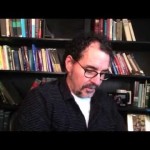We run our website the way we wished the whole internet worked: we provide high quality original content with no ads. We are funded solely by your direct support. Please consider supporting this project.

Answering an Objection to a Cross-Centered Approach to Scripture
READER: I normally like what he has to say, but Greg’s cruciform hermeneutics strikes me as dangerous. Doesn’t this thinking make us (as flawed humans) the arbiters or judges of truth? If the Word of God can be defined and explained away through our definition of what we (again, as flawed humans) believe to be the character of God, then doesn’t that (in a sense) make us like God? Aren’t we saying that we know what parts of the Word are “really” true and what parts were inaccurately written down? With this thinking, isn’t ALL SCRIPTURE up for debate as to whether is it is true or not? How can we tell if ANY Scripture is true, or just the misinformed opinion of the author?
GREG: Thanks so much for your question. I appreciate the seriousness with which you take this important theological topic. I’d like to make four comments by way of a response.
1. We are arbiters of truth (whether we like it or not)
As much as we might wish it were otherwise, I’m afraid that we flawed human beings are already the “arbiters of truth.” For example, you, as a flawed human, had to decide to accept the Bible as the Word of God rather than the Koran, the Book of Mormon, the Bhagavad Gita, or any other book. Even after deciding to believe the Bible, you, as a flawed human, have to decide what you were going to do with (say) its pre-scientific view of the earth and sky resting on pillars; its view of the sky as a rock-solid dome that holds up water with windows that get opened when it rains; and its view that the earth was created in six days, with light being created three days before the sun, moon, and stars. And, finally, you as a flawed human have to decide what parts of the Bible you think are still relevant for today, and which aren’t. For example, you must decide whether you think God still wants people to stone children to death if they sass back to their parents, whether God still wants people to keep slaves, or whether God still forbids women to speak in church and to wear braided hair and jewelry. So I’m afraid we have no choice but to decide matters of truth.
2. It’s not as dangerous as its alternative.
While you worry that my view is dangerous, I’d like to suggest that the truly dangerous view is one that believes that the Bible must be 100% accurate to be God’s inspired Word. This view means that your confidence in Scripture depends on your ability to resolve every one of the contradictions, scientific errors, and historical problems associated with it, and as I noted several blogs ago, most who explore these issues in a thorough and an intellectually honest way eventually come to the conclusion that it can’t be done. But as I also argued in that post, if God “breathed” the most perfect revelation of himself on the cross by, in some sense, becoming our sin (2 Cor. 5:21), why should anyone assume the way he “breathed” through Scripture completely rules out human imperfections?
3. Not all Scripture is created equal, according to Jesus.
It seems you’re concerned that I am not treating all parts of the Bible, and all portraits of God in the Bible, as equally authoritative. The thing is, the NT itself teaches us to not read the Bible this way. For example, Jesus said his teachings carried more weight than that of John the Baptist (Jn. 5:36), yet he also said that John the Baptist was greater than anyone leading up to his time (Mt. 11:11). So if Jesus’ teaching has more authority than John, then it has more authority than the entire OT. No wonder Jesus felt free to not only cancel, but to even reverse the OT command, “an eye for an eye and a tooth for a tooth.” In its place, he commanded us to “turn the other cheek,” and to “love [our] enemies” (Mt. 5:38-45). Jesus at one point dared to claim that “no one knows the Father except the Son” (Mt. 11:27). I have to believe there’s some hyperbole going on here, but Jesus is at least claiming that his revelation of God is so much greater than anyone before him that it’s as though they had no knowledge at all! Something similar is found in the Gospel of John when John contrasts Moses and Jesus by saying that, while the law came through Moses, “grace and truth” came through Christ (Jn. 1:17). This again must be somewhat hyperbolic, for it makes it sound like there was no truth prior to Christ. But it at the very least demonstrates that revelation of God in the OT is not on a par with Jesus.
This is what we find throughout the NT. For example, the author of Hebrews contrasts the way God spoke in various ways in the OT with the way he now speaks through his Son, for the Son alone is “the radiance of his glory “and “the exact representation of God’s essence” (Heb. 1:1-13). So too Paul, as well as the author of Hebrews, compares the OT to a “shadow” next to the reality, which is Christ (Col.2:17; Heb. 8:5; 10:1). I could go on and on, but I hope this is enough for you to see that the NT does not allow us to read everything in Scripture as being equally authoritative.
4. It’s not all up for grabs if the Crucified Christ is the measure by which we judge and interpret Scripture.
Finally, you wonder how anyone can know what is, and is not, “really” true if we allow any part of Scripture to be inaccurate. You also worry that to judge any part of the Bible to be inaccurate is to throw the whole Bible up for grabs. First off, I want you to know that, in submission to the authority of Christ, I believe that, rightly interpreted, all Scripture is true and “God-breathed.” But as I said above, I see no reason why this should require us to deny that it contains contradictions, an antiquated cosmology, and historical inaccuracies. As Luther, Calvin, and most Protestants since have insisted, to interpret Scripture rightly means that, whatever else we find in a passage, we must interpret it in a way that bears witness to Christ (Jn. 5:39-46; Lk. 24: 27). This is how we can know what is and is not “really” true. If our interpretation of a passage – including any portrait of God – doesn’t point us to the God who revealed his true character by bearing our sins and dying for his enemies on the cross, then I submit we have not yet arrived at the “right” interpretation.
In this light, what should we do when we come upon gruesome passages such as those in which an author prays for God to melt his enemies like a slug in the desert heat (Ps. 58:8), to burn them up alive “like tumbleweed” (Ps. 83:13-14; cf. 21:9), to “tear [them] to pieces” (Ps. 50:22), to “rain fiery coals,” “burning sulfur,” and a “scorching wind” upon their heads (Ps. 11:6; cf. 140:10) or, worst of all, to “go down alive to the realm of the dead” – that is, to be buried alive (Ps. 55:15)? How could God “breathe” such terrible prayers that are so contrary to the attitude Christ demonstrated when he prayed for the forgiveness of those who crucified him with his dying breath? Even more challenging, how do macabre passages such as this point us toward the one who died for, and prayed for, his executioners in this way?
It’s at this point that I suggest we remember that the God who “breathed” these passages is one and the same as the God who on the cross bore the sin of his people, and thereby took on the semblance that was far beneath his actual beauty – namely, a God-forsaken, guilty criminal. If the cross reveals who God truly is, and thus what God has always been like, then I suggest we read the Bible with our eyes open to ways in which he bore the sin of his people in the past, and took on appearances that were far beneath his actual beauty. All passages are “God-breathed” and “true,” but the truth of some “God-breathed” passages is found not in what they say, but in the fact that the humble God of covenantal love was willing to stoop this low to bear the sin of his people by owning these passages as his own.
Image by David Campbell. Used in accordance with Creative Commons. Sourced via Flickr.
Category: Q&A
Tags: Bible, Cruciform Theology, Inerrancy, Q&A, Scripture
Topics: Christus Victor view of Atonement
Related Reading

The Old Testament Is NOT on the Same Plane as the New Testament
Paul taught that unbelievers are blinded by “the god of this age” when they read the OT such that “their minds are made dull” and a “veil covers their hearts…when the old covenant is read” (2 Cor. 4:4; 3:14-15). This is why they are unable to see “the light of the knowledge of God’s glory…

Scripture’s God-Breathed Imperfections
“Inerrancy” of Scripture
As a conservative evangelical who accepted the “inerrancy” of Scripture, I used to be profoundly disturbed whenever I confronted contradictions in Scripture, or read books that made strong cases that certain aspects of the biblical narrative conflict with archeological findings.

How do you respond to 2 Timothy 1:9–10?
“…this grace was given to us in Christ Jesus before the ages began, but it has now been revealed through the appearing of our Savior Christ Jesus…” Those who hold that the future is eternally settled and that God knows it as such sometimes argue that God had to foreknow who would believe in order…

Doesn’t the open view demean God’s sovereignty?
The Open view demeans God’s sovereignty only if one assumes that “sovereignty” means “meticulous control.” By why think this is the way God wants to rule the world? The biblical narrative presents a God who gives humans (and apparently angels) free will, who is flexible and creative in running the world, and who relies at…

Drum Roll Please: Greg’s Final Critique of Bart Ehrman’s Article
This is the ninth and final of several videos Greg put together to refute Bart Ehrman’s claims published in the article What Do We Really Know About Jesus? Thanks for hanging in there for this last one. I know it was a long wait, but the holidays got inordinately busy for Greg. In this segment, Greg talks…

How do you respond to John 13:18–19; 17:12?
“I am not speaking of you all; I know whom I have chosen. But it is to fulfill the scripture, ‘The one who ate my bread has lifted his heel against me.’ I tell you this now, before it occurs, so that when it does occur, you may believe that I am he.’” Jesus prays…
